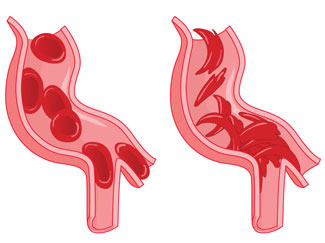
Frequently Asked Questions
Sickle cell anemia is a severe disease affecting essential hemoglobin molecules in the blood.
Find out if you are at risk - get tested
| Test Type | Testing Time | Fee |
All orders received before 3pm PST / 6pm EST are shipped out the same business day. All orders received after 3pm PST / 6pm EST or on weekends or holidays are shipped out the following business day. 24/7 online status check and account management available for all tests.
Which form of sickle cell disease is the HbS mutation associated with?Genovate Laboratories2016-12-22T01:48:12+00:00
The HbS (c.20A>T) mutation is the most severe mutation associated with sickle cell disease. If two copies of HbS are inherited, the most severe form of the disease (sickle cell anemia) will occur. If only one copy of HbS and one copy of a different mutation (HbC or HbE) is inherited, the disease symptoms are less severe.
What are the different mutations in the HBB gene that cause sickle cell disease?Genovate Laboratories2016-12-22T01:48:12+00:00
The mutation that results in the production of HbS is c.20A>T. The mutation that results in the production of HbC is c.19G>A. The mutation that results in the production of HbE is c.79G>A. Each mutation changes the amino acid sequence of the hemoglobin protein.
What is the HBB gene?Genovate Laboratories2016-12-22T01:48:12+00:00
The HBB gene encodes the β-globin component of hemoglobin. Mutations in this gene affect the shape and functionality of hemoglobin.
What are the types of sickle cell disease?Genovate Laboratories2016-12-22T01:48:12+00:00
The most severe form of sickle cell disease is HbSS or sickle cell anemia. Other forms of sickle cell diseases include HbSC and HbSE diseases, which generally have less severe symptoms than HbSS disease. Sickle cell mutations can also be inherited with beta thalassemia mutations, resulting in sickle/beta thalassemia disorders of varying severity.
How common is sickle cell disease?Genovate Laboratories2016-12-22T01:48:12+00:00
Sickle cell disease prevalence varies around the world. It is highest in sub-Saharan Africa affecting 1 in 500 people. It is one of the more common blood disorders in the US affecting around 100,000 people.
If my parents or grandparents have sickle cell disease, am I at increased risk?Genovate Laboratories2016-12-22T01:48:12+00:00
Yes. Sickle cell disease is caused by specific mutations in the HBB gene that can be passed from generation to generation.
How do I receive my results?dnaserver2016-12-22T01:48:13+00:00
You can choose to receive your results report by mail, email or both. The test includes one copy of the results by mail and one copy by email at no charge. The results report is issued immediately once the testing is completed.
Are my results confidential?dnaserver2016-12-22T01:48:13+00:00
Yes, your results are 100% confidential. No one will be able to access your account or your results unless you give them your confidential account login. You can change the password to your account at any time. Please remember to safeguard your login information and not share it with anyone.
How long do I have to send the samples back?dnaserver2016-12-22T01:48:13+00:00
The DNA testing kit does not have an expiry date so you can use the kit at any time. Once the DNA sample is collected, the sample should be returned to the laboratory for testing within 3 months of the collection date. The DNA sample will remain stable for 3 months at room temperature after collection.
Can I have more than one copy of the results?dnaserver2016-12-22T01:48:13+00:00
If your sample contains intact DNA, then a full DNA profile will be obtained. However, if your sample does not contain DNA or contains degraded DNA, then only a partial profile or no profile at all is obtained. Even if no profile is obtained, the cost still applies for each sample that is submitted.
Is there an age limit?dnaserver2016-12-22T01:48:13+00:00
No, there is no age limit for Sickle Cell Disease DNA Test testing. The test can be performed on individuals at any age, even newborns. The sample is collected easily and discretely using buccal swabs.
Which countries can you ship to?dnaserver2016-12-22T01:48:13+00:00
The DNA collection kits can be shipped to any country in the world.
How long will testing take?dnaserver2016-12-22T01:48:13+00:00
DNA testing begins immediately the day that your samples arrive at the laboratory and is completed within 5 to 7 business days. In some special situations, additional testing may be required, which could increase the turnaround time by a few extra days. You can check the status of your test online 24/7 using your secure account login. Your test report is released immediately once testing is complete.
